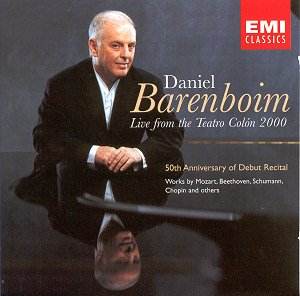I still have Barenboim’s original set of the 32 Beethoven
Sonatas on EMI, where a photograph of the dashing young virtuoso, then
still in his twenties, adorned the booklet cover. Here he is on the
cover of his very latest issue, now in distinguished middle age, in
a recital to mark 50 years at the top of his profession. The wild audience
reaction was predictable, given that this is his home city and he is
one of its most famous sons. I’m sure, as an occasion it was unforgettable,
but it is slightly uneven as a purely aural experience.
The two big sonatas by Mozart and Beethoven provide
the real ‘meat’ in this recital, and Barenboim’s credentials in both
composers are pretty impressive. But this playing is definitely that
of the elder statesman than the young firebrand. The opening of the
Mozart C major clearly demonstrates this. As luck would have it, a recital
I reviewed recently by Evgeni Brakhman (one of the Martha Argerich
presents series) opens with this very piece, and a comparison is
interesting. It’s not just a question of the sprightlier tempo that
Brakhman adopts, and which seems more fitting, but quicksilver passage-work
is more cleanly articulated. Barenboim may be being a tad careful as
it’s his opening item, but I sensed hesitancy, a slightly lumpy quality
to some of the Alberti-style accompaniments and scalic runs. The brightly
voiced piano takes on a hard edge even in mezzo-forte sections (such
as 2’37 into the first movement), which gives dynamic contrast but is
wearing on the ear. The slow movement certainly has the gravitas
I missed in the Brakhman, with a nicely contrasting minor section, but
the finale again misses that sense of abandon and spontaneity that the
younger Barenboim would surely have provided. He seems more at home
in the closing cantabile section, which is beautifully phrased,
though the piano’s tone is again slightly troublesome.
It’s good to report more success in the ‘Appassionata’,
always one of Barenboim’s favourites. Here we have a sense of discovery,
of fantasy, that one sensed in those earlier EMI recordings. The long,
dramatic first movement gets a reading of great power and dynamic flexibility.
His subtle phrasing of the A flat second subject (2’00) contrasts well
with the stormy hammering of the 5th Symphony motif at 5’22.
His fingers also appear to have warmed up, as the difficult semiquaver
passages in the finale are well brought off. This performance brings
the house down, as well it might.
After these two works, the rest appear basically as
a long string of encores, though certainly enjoyable. It’s good to hear
this musician in Scarlatti, two tiny sonatas full of mood and temperament,
though played a little safe by the side of, say, Argerich or Perahia.
The Schubert and Schumann items are well despatched, and I was impressed
by his Chopin. The Etude is beautifully done, tossed off with
real virtuosic flair, as if something had finally awakened in him. The
Nocturne (a substantial six-minute one) is also very fine. I
always liked his full set of these wonderful pieces, recorded for DG
in the ’80s, now released at budget price and very recommendable. His
feeling for rubato and the singing line greatly impresses, and the reading
has a melancholy introspection that is haunting.
The booklet, which is devoted to Barenboim and has
nothing about the music, says that the final, Latin American items were
‘chosen spontaneously’. They are all short, punchy and predictably send
the house into raptures. Recording quality is a touch close and bright,
and seems to vary slightly, as if some microphone experimentation had
taken place.
This will certainly be a must for Barenboim fans, though
I’m not sure where it will fit otherwise. Everything is well enough
done, occasionally outstanding, but I’m not sure there is anything that
is new or special enough to warrant rushing out and spending full price
on.
Tony Haywood

